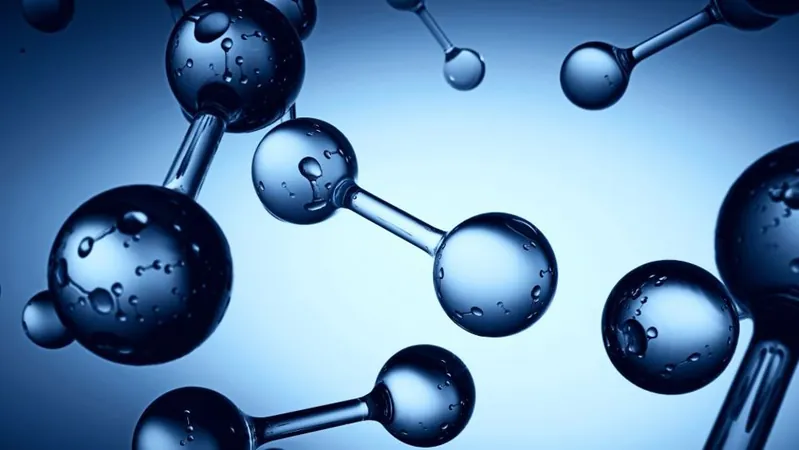
Breakthrough in Hydrogen Generation: Catalyst's Surprising Self-Improvement!
2025-01-09
Author: Siti
A Pioneering Advancement in Hydrogen Production
A pioneering research team from Nottingham University has unveiled an astonishing advancement in hydrogen production using ammonia, revealing that their newly developed catalyst becomes more active over time, a phenomenon rarely observed in catalyst chemistry. This innovative work was conducted alongside Birmingham and Cardiff Universities and has been published in the prestigious journal *Chemical Science*.
The Promise of Ammonia
Ammonia is emerging as a promising zero-carbon energy carrier due to its high volumetric energy density. However, extracting hydrogen from ammonia efficiently and sustainably has long been a challenge. The University researchers have taken a bold step forward by creating nanosized clusters of ruthenium (Ru) integrated into graphitised carbon. These Ru nanoclusters effectively split ammonia molecules into hydrogen (H₂) and nitrogen (N₂), thereby unlocking the potential of ammonia as a clean energy source.
A Catalyst That Improves Over Time
Traditionally, catalysts tend to lose their efficiency over time, rendering them less effective after prolonged use. Yet, this groundbreaking catalyst bucks the trend by increasing its activity during the reaction process. Understanding the mechanisms that contribute to this unexpected behavior at the atomic level is vital for paving the way for next-generation heterogeneous catalysts.
Innovative Catalyst Design
Dr. Jesum Alves Fernandes, an Associate Professor at Nottingham's School of Chemistry and co-leader of the project, explained, "Conventional catalysts typically comprise nanoparticles, which unfortunately result in many atoms being inaccessible for reactions. Our method, in contrast, begins with single atoms that self-assemble into controllable clusters. By halting the cluster growth at precisely 2-3 nm² footprints, we maximize the number of atoms available for reactions, leading to heightened catalytic efficiency."
Magnetron Sputtering Technique
To design these innovative catalysts, the team employed a process known as magnetron sputtering, which generates a stream of clean, metal atoms without the use of solvents or additional reagents. This technique not only improves the catalyst's activity but also ensures the judicious use of rare materials like ruthenium.
Discovering Unexpected Activity
Dr. Yifan Chen, a Research Fellow at Nottingham University, added, "To our astonishment, we discovered that the activity of the Ru nanoclusters actually increases over time—this revelation defies what we understand about catalyst deactivation. By employing scanning transmission electron microscopy, we were able to visualize and count the atomic transformations within each nanocluster throughout the reaction stages."
Structural Changes and Stability
The research team observed that initially disordered ruthenium atoms reorganize themselves into stable truncated nano-pyramids with stepped edges over the course of the reaction. These unique structures showcased exceptional stability, adapting continuously to enhance active site density—ultimately boosting hydrogen production from ammonia even in high-temperature environments.
A Shaping Future for Catalyst Design
Professor Andrei Khlobystov, also from Nottingham's School of Chemistry, stated, "This groundbreaking discovery reshapes the future of catalyst design by demonstrating a stable, self-improving system for hydrogen generation from ammonia. We are hopeful that this innovation will play a pivotal role in advancing sustainable energy technologies, supporting the global transition towards a zero-carbon future."
Conclusion: A Shift Towards Cleaner Energy
As the world anticipates a shift towards cleaner energy sources, this unexpected breakthrough in catalyst design could redefine hydrogen production methods and propel the use of ammonia as an eco-friendly energy carrier. Stay tuned as this research could change the landscape of green technology forever!


 Brasil (PT)
Brasil (PT)
 Canada (EN)
Canada (EN)
 Chile (ES)
Chile (ES)
 Česko (CS)
Česko (CS)
 대한민국 (KO)
대한민국 (KO)
 España (ES)
España (ES)
 France (FR)
France (FR)
 Hong Kong (EN)
Hong Kong (EN)
 Italia (IT)
Italia (IT)
 日本 (JA)
日本 (JA)
 Magyarország (HU)
Magyarország (HU)
 Norge (NO)
Norge (NO)
 Polska (PL)
Polska (PL)
 Schweiz (DE)
Schweiz (DE)
 Singapore (EN)
Singapore (EN)
 Sverige (SV)
Sverige (SV)
 Suomi (FI)
Suomi (FI)
 Türkiye (TR)
Türkiye (TR)
 الإمارات العربية المتحدة (AR)
الإمارات العربية المتحدة (AR)